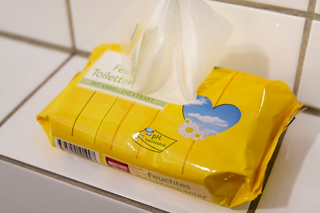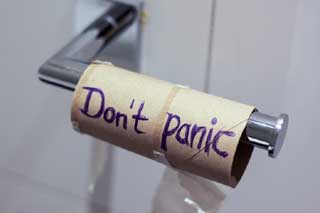Important information from wastewater companies: Dispose of toilet paper alternatives correctly – avoid backflow from sewers
You can do that if you don’t flush these things down the toilet after use, but dispose of them with household waste, say the sewerage companies of the Kommunales Netzwerk Abwasser or Community Network WasteWater. Otherwise there is a risk of blockages in the sewer from your house, which can lead to backflow, sewer flooding of your house and consequent expensive work to put it right, warn sewage disposal companies.
Toilet paper with a decisive advantage
Real, genuine, normal toilet paper starts to break up as soon as it comes into contact with water. It starts in the toilet bowl, continues in the sewage pipe and usually doesn’t get to the main sewer in one piece. “We hardly even see toilet paper floating in the larger sewers,” say those who work down there and keep our sewage system running.
Toilet paper – everything else is poo

Saves trouble down the pipe: throw wet wipes and other alternatives to toilet paper in the trash can instead of the toilet bowl
Save yourself trouble!
The consequences can be quite unpleasant: from backups and nuisance odour to unusable sanitary installations such as toilets, showers and washbasins and even flood damage. It can also really cost you money – if you can even get a tradesman on short notice.
But even if these cloths and papers slip smoothly through your pipes, they can still cause problems at other points in the sewage system. Especially in pumping stations the tear-proof cloths can block the pumps. This can lead to hygiene problems in an entire district, which must be prevented at all costs. Right now we all have other more important problems.
Dispose of toilet paper alternatives correctly!

Marco Schlüter, head of KomNetABWASSER (ComNetWasteWater): “Only toilet paper belongs in the toilet.”
Also inform your neighbours! In a multi-family house you share some sewer pipe and the costs for the plumber are shared by all. You are also welcome to share this article in the social media!
Contact person
Marco Schlüter, IKT
Manager KomNetABWASSER
Phone: +49 (0) 209 17806-31
New hotline for wastewater companies: +49 (0) 177 2801198
E-mail: schlueter@ikt.de
Municipal network – open to all wastewater companies
 The Community Network WasteWater (KomNetABWASSER) is an initiative of currently about 60 wastewater network owners with the aim of jointly implementing the municipal wastewater disposal obligation in a better and more citizen-friendly manner – as cost-effectively as possible and in accordance with the generally accepted rules of technology. The non-profit IKT ‑ Institute for Underground Infrastructure organises and supports the network.
The Community Network WasteWater (KomNetABWASSER) is an initiative of currently about 60 wastewater network owners with the aim of jointly implementing the municipal wastewater disposal obligation in a better and more citizen-friendly manner – as cost-effectively as possible and in accordance with the generally accepted rules of technology. The non-profit IKT ‑ Institute for Underground Infrastructure organises and supports the network.
Even during the coronavirus epidemic the network participants are meeting regularly in virtual space. Since there has been a real toilet paper crisis in many places and many people have to find alternatives, the network participants are increasingly discussing problems caused by the incorrect disposal of materials through the toilet. It is repeatedly pointed out that not only the companies have to eliminate problems caused by wet wipes and other non-flushable products, but that problems often arise on the premises of their customers.
More about the network of wastewater companies on the KomNetABWASSER website.
